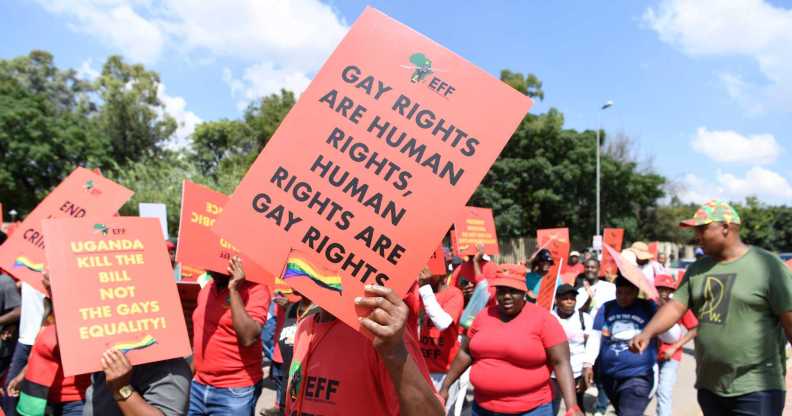Tory government funding anti-LGBTQ+ groups in Uganda, report finds: ‘Not an isolated mistake’

A new report has revealed funding from the UK government is being given to anti-LGBTQ+ groups (Frennie Shivambu/Gallo Images via Getty Images)
A new report has revealed funding from the UK government is being given to anti-LGBTQ+ groups (Frennie Shivambu/Gallo Images via Getty Images)
The UK government is helping to fund the work of anti-LGBTQ+ groups in Uganda, a new report suggests.
Published by the Institute for Journalism and Social Change (IJSC), the report has found a “staggering” scale of connections between international donors – who say they support queer rights – and anti-LGBTQ+ groups in Uganda.
“The picture that emerges is not about an isolated mistake or rare oversight, but about what appear to be systematic failures to make top-line rights commitments meaningful, to align funding decisions and ensure they don’t undermine those promises,” the document’s author, Claire Provost, states.
The report estimates that, since 2014, countries including the UK and US have made about $75 million (approximately £60 million) in aid donations to projects where anti-LGBTQ+ organisations are involved.
The UK government has told PinkNews it does not “currently” provide funding to the IRCU.
Data analysed primarily from the International Aid Transparency Initiative (IATI), and aid donors themselves, revealed that the Inter-Religious Council of Uganda (IRCU) is a direct recipient of more than £100,000 of UK aid.
There is no evidence that any of this money specifically paid for anti-LGBTQI activities. However, in 2014, the IRCU, alongside other conservative religious groups, helped push for anti-LGBTQ+ legislation, which made headlines around the world as a “kill the gays” bill because of the inclusion of the death penalty.
The bill was subsequently ruled invalid, but earlier this year the religious group vowed to get the legislation back on to the floor of Uganda’s parliament.
In an open letter published on 15 February, the group expressed its “great concern” about the “growing spread of homosexuality” and the “LGBTQ agenda” in Uganda, stating that queer people will have a negative impact on the wellbeing of children.
Two weeks after the IRCU published its letter, the Anti-Homosexuality Bill was tabled in the East African nation’s parliament again.
The bill was subsequently passed to the sound of cheering and applause among MPs.
The proposed law would effectively make simply being queer illegal, with the death penalty also possible, while LGBTQ+ allies who do not report the people they are supporting to the authorities are also at risk of lengthy prison sentences.
Uganda’s president, Yoweri Museveni, however, has not yet signed the bill and instead sent it back to parliament – with the aim of making it even more harsh.
‘Deeply troubling’
World leaders and LGBTQ+ groups universally have condemned the bill.
UN human rights chief, Volker Türk, described the passage of the bill as “deeply troubling” and said it was “probably among the worst of its kind in the world”.
White House press secretary, Karine Jean-Pierre, told reporters that if the bill is enacted, the US could issue economic sanctions against Uganda.
“If the [bill] is signed into law and enacted, it would impinge upon universal human rights, jeopardise progress in the fight against HIV/Aids, deter tourism and [investment] in Uganda and damage Uganda’s international reputation,” Jean-Pierre said.
“It is one of the most extreme anti-LGBTQ+ laws in the world. Human rights are universal, no one should be attacked or imprisoned simply because of who they are and who they love.”
The IJSC report concludes: “Ongoing funders have urgent questions to answer, but so do other providers of recent funding, about how they may have bolstered the capacity and influence of organisations involved in fermenting homophobia and advocating for the current anti-LGBTQI bill that includes the death penalty and could push many people to have to escape Uganda.”
The report’s authors state that even “progressive and feminist funders” need watchdogs.
A spokesperson for the Foreign Office told PinkNews: “The UK government has long been at the forefront of promoting LGBT+ rights internationally and is concerned by the increasing criminalisation of LGBT+ persons in Uganda which threatens minority rights and risks persecution.
“All UK aid partners are put through rigorous due diligence assessments before receiving any funding. The UK does not currently provide funding to the Inter-Religious Council of Uganda.”

